[Warning: May contain sarcasm.]
Not to take a side in the struggle between Merril et al.’s New Wave and more traditional science fiction and fantasy, but…
One may admire the artistry of the stories in anthologies like England Swings SF, even if one eventually tires of the pessimistic tone taken by such young scamps as Ellison, Spinrad, and Ballard. Why can’t these authors be more like their venerable predecessors? Here are five instances of the sunnily optimistic science fiction that exemplified the genre in the days before the younger set decided to indulge in such gloomy literary prose.
The War in the Air by H. G. Wells (1908)

Bert Smallways embraces Edwardian can-do-ism; he is determined to enrich himself without much distress over petty ethical concerns. Thus, when a moment of altruism leaves Bert stuck in a runaway balloon with the blueprints for Butteridge’s revolutionary heavier-than-air flying machine, Bert does not lament his temporary misfortune. Bert takes the long view and considers what sort of price he can exact for the blueprints—and from whom.
Bert’s forthright determination and not entirely truthful claim that he is Butteridge earns him a place on the team of fellow visionary Prince Karl Albert. Karl Albert has a simple dream: conquer the world through applied air power! To this end, Karl Albert’s vast air fleet sets off to crush America with an overwhelming sneak attack. Bert accompanies the aerial armada. Bert Smallways gets to see firsthand how a paradigm-breaking technology can utterly transform a stodgy world.
***
“With Folded Hands…” by Jack Williamson (1947)
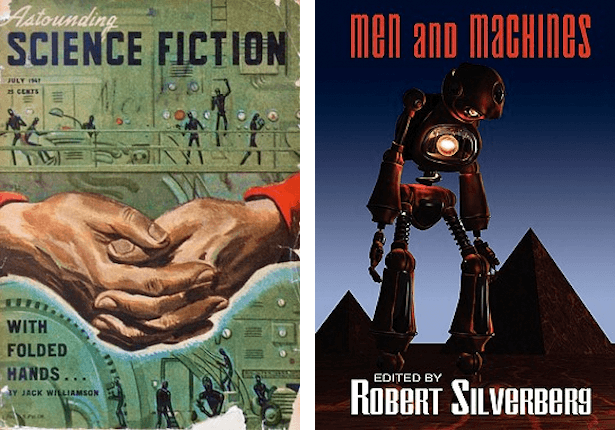
Salesman Underhill sells robots, but even he would admit that the best robots often fall short of perfection. Too many of the robots and other mechanicals on sale have been poorly designed or badly made. Not only that, but the market for such contrivances has become oversaturated. The appearance of a new competitor is an unwelcome development. At first.
Underhill soon learns that Humanoid Institute’s mechanicals deliver what lesser companies can only promise. Equipped with a crystal-clear knowledge of humans’ best interests, the Humanoids leave no human need unaddressed. Before the Humanoids, humans had to labour by the sweat of their brow. Now that they have arrived, humans can look forward to an eternity of perfect tranquility, as the robots have taken over every aspect of human existence…
***
Earth Abides by George R. Stewart (1949)
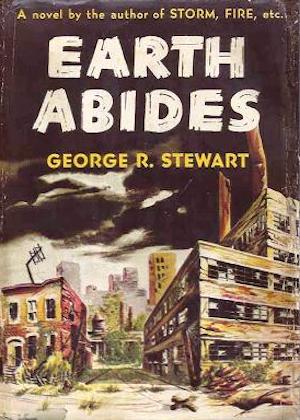
Sidelined by a snakebite while in California’s mountains, Isherwood Williams returns to civilization to discover that, in his absence, virtually the whole of humanity has perished from a novel and highly contagious pandemic. This is a real bummer, but Ish does not succumb to despair. He and fellow survivor Em found a new community in their native California.
Armed only with determination, what he already knows, and the books moldering in the abandoned libraries of the Bay Area, Ish schools the children of his town. True, reading, and arithmetic may seem to have little immediate relevance to a generation more interested in procuring their next meal. Nevertheless, Ish is determined to inculcate the younger generation with the values and knowledge of Western civilization.
Success should be certain. Who, given a choice, would choose to degenerate into a tribe of superstitious hunter-gatherers?
***
The Space Merchants by Frederik Pohl and Cyril M. Kornbluth (1952)
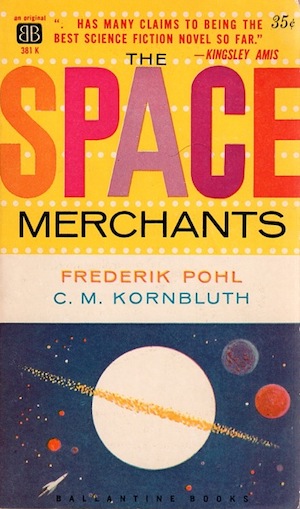
No matter the challenge, humanity’s ingenuity always finds a solution. Air pollution is met with nose filters, oil shortages with pedicabs, fresh water shortages with reasonably priced brackish water. Consumerism works and nobody is more important to making it work than the admen who persuade the masses that they could live in the best of all possible worlds if only they bought the right products. Star-class copywriter Mitch Courtenay is one such adman.
Mitch’s employer, the Fowler Schocken advertising agency, lands a doozy of a contract: sell the public on the notion of settling inhospitable Venus. Fowler Schocken assigns the task to Mitch. Venus has little to recommend it, rivals may scheme to sabotage the plan, and assassins may even try to kill him, but not even being kidnapped can stop a determined adman like Mitch Courtenay!
***
“The Year of the Jackpot” by Robert A. Heinlein (1952)
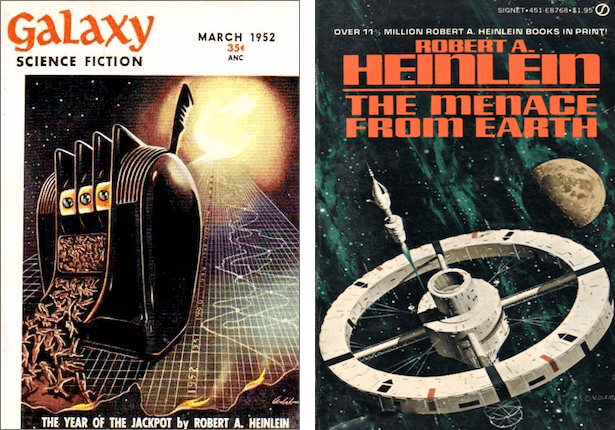
When statistician Potiphar Breen is not advising insurance companies on current and future trends, he spends his time studying the cycles of human behaviour that govern the world. What might seem like unrelated bizarre events to others are, for Breen, indications of the hidden order governing reality. To paraphrase noted physicist Jon Osterman, Breen is a puppet like everyone else, but he is a puppet who can see the strings.
Breen’s work assures him that the world is marching towards a day when all manner of seemingly unrelated events will come to a simultaneous head—the eponymous Year of the Jackpot. Some might be alarmed at this prospect, but Breen embraces the opportunities at hand. Why worry about a tomorrow that may never come when Breen can win the woman of his dreams and spend the rest of his life with her?
***
These are just the first five works that came to mind. There are many, many more. What, oh what, have the bright young things of today written that are as joyful and optimistic as these cheery tales from yesteryear?
In the words of Wikipedia editor TexasAndroid, prolific book reviewer and perennial Darwin Award nominee James Davis Nicoll is of “questionable notability.” His work has appeared in Publishers Weekly and Romantic Times as well as on his own websites, James Nicoll Reviews and Young People Read Old SFF(where he is assisted by editor Karen Lofstrom and web person Adrienne L. Travis). He is a four-time finalist for the Best Fan Writer Hugo Award and is surprisingly flammable.










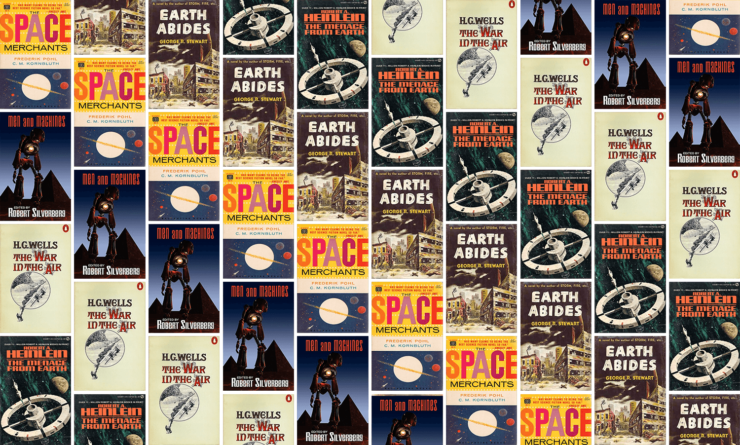
War in the Air has an interesting section in which the Germans discover being able to bomb New York into rubble is not the same as being able to occupy it.
Ah, we’re being ironic. Some people still have an exaggerated idea of what air power can accomplish. Like WW II didn’t clearly demonstrate it’s limitations.
1: Because I forgot to include a footnote, is why.
“When the Bough Breaks” by Lewis Padgett is all about parental love for a child with many gifts http://corabuhlert.com/2020/02/10/retro-review-when-the-bough-breaks-by-lewis-padgett-a-k-a-henry-kuttner-and-c-l-moore/. Likewise, Kuttner’s Absalom ends with a man happily dreaming of future grandchildren (http://variety-sf.blogspot.com/2008/03/henry-kuttner-absalom-short-story.html). And Bradbury’s The Playground has a wish come true.
A Canticle for Leibowitz is another cheery tale. Sure, civilization suffers some regrettable setbacks, but people are resilient, and eventually recover to exactly the point where they were before.
Mordecai Roshwald’s Level Seven clearly indicates the need for sensible, forward-thinking disaster planning.
And Aldous Huxley’s Brave New World – well, the title says it all, doesn’t it? “How many goodly creatures are there here! How beauteous mankind is! O brave new world, that has such people in ‘t!”
Bradbury’s “And There Will Come Soft Rains” is a tribute to human potential.
“The Year of the Jackpot” is kind of funny, because in 2012 a mathematician predicted a 50 year cycle of violence would come to a head in… 2020
May I point out works planned but never written? Heinlein’s “The Sound of His Wings” (Nehemiah Scudder takes over the US) and “The Stone Pillow” (living under his regime). Not good examples, because he eventually realized that their relentless level of cheerfulness meant that he didn’t want to write them.
Oh, how about The Day of the Triffids? A couple and some friends they picked up along the way withdraw to pursue bucolic country life while nature is healing.
Merril on the New Wave in F&SF in January 1967:
“All in all, the [New Wavish] book leans heavily toward concentration on polish and technique, and the basic fiction values, and is little concerned with idea content.
“To a great extent, this trend is characteristic of the change in s-f over the last twenty years, and I suppose that, as one of the most earnest supporters of the trend, it ill behooves me now to cry, ‘. . . but I never meant it to go *this* far!’ ”
Just saying! :) (When Merril says something about the New Wave that Darrell Schweitzer might …)
I’d add Sir John Hackett’s The Third World War: August 1985, where war breaks out between the Warsaw Pact and NATO. Remarkably few nuclear weapons get used, and the war is quickly over without most of central Europe being turned into a nuclear wasteland.
————-
Typos
“petty ethnical concerns” (under the War in the Air) probably should be petty ethical concerns
@11: The typo’s been corrected, thanks!
@12 swampyankee. Gosh I remember that book coming out. I seem to recall Hackett’s idea that in a one time tit for tat, the UK would allow the USSR to nuke Birmingham.
At the time, readers suggested a more acceptable loss was Manchester
@11 @13 I have that book in hardcover. At least one author used the scenario in a pretty good thriller, “Team Yankee”, in the late 80’s.
…but…. in A Canticle for Leibowitz society DOES recover to where they were….and then it all blows up / goes nuclear again. In Earth Abides, they DO sink into tribalism and hunter gathering – even a new dialect emerges among the young people of the group. The last part of Earth Abides is so sad…the “end of Ish” has stayed with me for years. Im not sure how these are seen to be cheery / cheerful? Maybe I need more coffee……
@15
Mr Nicoll will, occasionally, engage in some light, barely noticeable, sarcasm.
Me, sarcastic?
Fans of Team Yankee might enjoy Bob Forrest-Webb’s Chieftains diverting.
Earth Abides is one of my favorite all-time books — I was introduced to it by an (amazing) English teacher in 8th grade who knew that I was otherwise bored. It made such a strong impression on me. Glad to see it pop up on this list — it seems to be mostly forgotten now.
A friend of mine, back somewhere around 1980 or so, bought a copy of The Third World War: August 1985, got as far in as a couple of paragraphs, toGeneral Sir John Hackett lauds our steadfast and thoroughly reliable ally in the region, the Shah of Iran, at which point he flung it across the room.
It is interesting how quickly things can age….
Do you know the feeling when you’ve read an amazing story and you’d like to tell everybody to also read it because it’s just so good?
That is how I felt when I’d read the last line of Williamson’s “With Folded Hands…”.
I can’t recommend it enough.
But I wouldn’t call it upbeat. Ironically, I’m sure the robots of the story would be convinced that this is an upbeat story but in reality it’s more of a horror story if you think about it.
Someone ruined our fun by adding a warning at the top.
:-(
I remember chuckling away to the story of a malcontent who learns to appreciate the world he lives in and the individual who runs it – the adorably named ‘Big Brother’. Can’t remember the title right now, but it’s definitely worth checking out.
Oh! Maybe “Year of the Jackpot” is what William Gibson’s latest alternate history novels are referencing?
@13, you have it backwards. In Hackett’s story the Soviets nuke Birmingham on the basis of believing that showing they were willing to use nukes would cower NATO, but they choose to avoid an “important” city to avoid an immediate all-out response. NATO responded by nuking Minsk in a proportional retaliation.
@24 I’ve always assumed that was the case.
Writing apocalyptic fiction in the fifties made this probably just too easy, but both “On the Beach” and “Alas, Babylon” certainly qualify.
And let’s not forget Jack London’s “The Iron Heel” from 1908.
@28 I’m not sure that “The Iron Heel” qualifies.
The complete routing of the job creators may make this too downbeat for James’s taste.
Philip Wylie’s The End of the Dream is from 1971, so the New Wave had already left its mark. He wasn’t of that generation of authors, though, but contemporary with those featured here, and his relentless cheerfulness pervades much of his work, going all the way back to the 1930s and Gladiator.
I inherited a copy of Earth Abides from my mother although, interestingly enough, I never connected it with the SF she had on the shelves elsewhere, exposure to which corrupted me helped make me the degenerate SF fan well rounded person I am today.* It may even be an early printing. I need to find it …
*(The policy in our home was more or less that if you could reach it you could read it. Whether or not this was wise I leave to others to decide, given that some of what I consumed as a 12 year old included such YA classics as Robert Silverberg’s The Second Trip.)
Just wanted to say that Earth Abibes gets a loving reference in Naughty Dog’s The Last Of Us – there’s a section set in a sewer with a survivor called Ish putting together a small community and teaching the young. Unfortunately it doesn’t last, but he does get away in the end.
@2 = The citizens of Dresden, London and Bristol [to name but three] might wish to disagree….
“Greener than you think” by Ward Moore. The protagonist remains cheerful up to the last page!
I also remember an happy Poul Anderson short story, “In memoriam” I think it was. It *starts* with the last days of the last human on Earth after presumably a nuclear war, and then zoom through the ages till the sun engulfs Earth and the only remaining traces of humanity having ever existed are the Voyager and Pioneer probes lost in interstellar space.
@32, those cities suffered terrible damage. Did it end the war? No. We discovered the hard way just how much punishment a country can take and remain functional.
33.
I think the story you have in mind is “Murphy’s Hall”.
Being as you’ve spoiled it, I’ll note that when I read it, I kept expecting that there would be some hope. Humanity would recover, or if not humanity, there would be another intelligent technological species.
Hope and hope, but nothing. Murphy’s Hell.
I know Earth Abibes is a typo but it is only that makes me realize all too late that piece I did on bar stories could have been called “Earth Imbibes.”
@35
No, I checked, it’s really titled “In memoriam”, and there is not much of a story to be spoiled:
The beginning is
“Against the inexorable forces of time, will humanity leave any lasting mark? The last man on Earth knew not that he was. Nor would he have cared. He had met very few other humans in his life, and none since his woman coughed herself into silence. How long ago that happened, he did not know either. He kept no count of years, nor of anything else. She lay blurred in his memory, but so did most that was more than a few days past. Day-by-day survival took all his wits and strength, such as they were.”
No love (in the sarcastic sense) for John Brunner’s The Sheep Look Up? I’d also mention Mary Gentle’s The Golden Witchbreed (sequel to another story, but may be read independently, I think). Or maybe I’m thinking of the sequel? I think the sequel is Ancient Light. Maybe that’s the one that’s so upbeat in the sense of this thread.
“Alas, Babylon” is a SF classic with hardly any gloom. A small town in (pre Disney World) central Fla survives an atomic attack on the US. They are lucky to be just far away from any targets, and they end up in a pocket spared by fall-out. It is hopefull as the various townspersons get it together and survive the aftermath. The book ends with a visit by the US Airforce and news that the US, under the new President (the former Secretary of Housing) is beginning recovery.
I vividly remember a scene early in the book, where the President of the local Bank goes to the Western Union Office after the attacks begin, to cable the Federal Reserve Bank in Jacksonville with some questions. The telegraph operator is sending the cable when there is a far off flash of light and the telegraph goes dead. She turns to the Bank President and says “I’m sorry sir, I can’t send your cable, Jacksonville doesn’t seem to be there anymore…”
I remember a figure of that period commenting on the claim that science fiction was escapism: ~”While others were living with the realities of marathon dancing and bathtub gin, we were escaping into world-wide disasters.”
The Space Merchants gets most of the cred, both academic and popular, but to my mind Gladiator-at-Law is much more plausible — the decayed Levittowns, the stock market decayed into explicit gambling, the bloody Games for popular entertainment; perhaps the least-realistic thing about it is the optimism of the ending, where in tSM the narrator simply escapes. Pohl & Kornbluth were hardly alone in rescuing their characters; in Wyndham’s The Chrysalids our heroes also leave their post-holocaust religion-ridden uncivilization to rot. Pangborn’s Davy at least leaves us hanging….
And for something more antique, consider Benét’s “The Place of the Gods” (1937; aka “By the Waters of Babylon” — thanks to @27 for the memory trigger). Or further back, E. M. Forster’s “The Machine Stops” (1909).
@20: I’ve lived in the fallout shadow of that plant for half a century; the citizens of Plymouth were disenchanted long ago.
@38: If you’re going to cite Brunner, go earlier; The Sheep Look Up offers a solution (however improbable), where at the end of Stand on Zanzibar we’ve destroyed our last plausible chance. Or for something almost as recent, consider Christopher’s Pendulum. (I don’t know how late a time @0 was thinking of; ISTM there was plenty of pessimism throughout the 1960’s.)
L. Ron Hubbard’s Final Blackout, first serialized in 1940, is every bit as cheerful as one would expect from reading the description.
@40: That was Asimov
“It was a funny kind of escape literature that had the youngsters who read it concerned about the consequences of the waste of fossil fuels forty years before all the self-styled normal and sensible human beings felt it necessary to become interested.”
https://www.blackgate.com/2014/02/10/vintage-treasures-the-man-who-awoke-by-laurence-manning/
As I recall, Alas, Babylon was inspired by a friend of Pat Frank, who on being told that a third of the US could die in a nuclear exchange, responded “Wow! Fifty or sixty million dead! What a depression that would make!” Frank thought “What a depression” fell a bit short of the mark.
Does Olaf Stapledon’s First and Last Men: A Story of the Near and Far Future count?
There’s “The Cold Equations”, an uplifting tale whereby against difficult odds much-needed supplies are delivered to planetary outpost and many lives are saved.
I was reminded of this by seeing a review of the new movie Stowaway in which a stowaway shows up on a two-year mission to Mars.
@42: the quote I gave was specifically a sharp contrast in a small space, not the lengthy comment on a prophecy the mundane world had neglected. I remember the form I quoted coming from something well before 1974 — could have been Pohl, or even Campbell — although the general see-who’s-laughing-now tone probably shows up in many quotes.
@44: Yes, except for the new species of humanity that keep popping up and ruining all the peace and quiet.
I can highly recommend Olaf Stapledon’s Sirius as a heart-warming tale about man’s best friend. It is a story that will stay with you a long time.
I actually just finished Earth Abides last night and found it unbelievably mediocre, like reading library paste. There is a cover blurb on mine that compares it to Robinson Crusoe, and it does indeed compare pretty well — in the sense that it doesn’t really have a plot. It meanders aimlessly in a vaguely misogynist 1950’s way through a collection of loosely connected episodes that start nowhere in particular, pass through nowhere in particular and ends up nowhere in particular.
There is also an introduction by Connie Willis praising it as the greatest of all post-apocalypse novels. It isn’t. It is barely comparable to Alas, Babylon and cannot even hold a candle to On The Beach and A Canticle for Leibowitz.
@47: I believe I read Sirius when I was in high school in the late 70s. It was interesting take on interspecies romance IIRC.
What About A Boy and His Dog? There’s a cheery tale!
@48: If you were expecting Earth Abides to be comparable to Alas, Babylon or On The Beach, it is not like them and it doesn’t have to be. It appears that you bounced off of it hard. That’s okay. You don’t have to like it. But it is a much better book than your description.
@46: Sorry about that. Asimov did make similar comments in a variety of formats (and lengths), so it might still be him, but you’re right that there are other authors who might have made the same observation.
@38 Ancient Light was indeed the sequel of The Golden Witchbreed and its ending did ensure that there was little scope for further stories in the series. It was nice that the surviving characters could find the energy to blame each other even as the planet became uninhabitable.
Looking at John Brunner’s excellent output, may I put in a word for the optimistic finish of Total Eclipse with not one but two civilizations collapsing completely independently.
The Space Merchants optimistic? Hmm… My idea of optimism isn’t quite the same. The book derives heavily from Pohl’s advertising background and is like a list of marketers’ dreams from the immediate post WWII era. Oddly, computers have made a lot of them come true. Sure, the hero triumphs over a bunch of adversity but overall the message is uh, a bit downbeat. When I first read the book in the late ’50s one detail that stuck with me was the targeted ads that appeared in the air. We’re awfully close to that. Cultured meat grown in factories where workers are exploited to the hilt is another great feature.
If an individual’s one time success in evading the Marketers is your idea of upbeat it might be an upbeat story. To me it’s about a grim future where most people will be victims.
I’ve always thought The Witches of Karres by James H. Schmitz was a lot of fun. Full on Space Opera meets a little Fantasy, a lot of Adventure, and a healthy dose of Comedy all with three witches who cause havoc for their spaceship captain. My dad gave me his well-worn copy to read when I was teen, and I loved the young female protagonists. As an adult it makes me laugh out loud because – an adult starship captain trying to wrangle three crazy people under the age of 14. Very little doom and gloom in site and it wraps up neatly. David Freer and Eric Flint (who had edited The Witches of Karres) have written 3 sequels books with the characters and their adventures. It’s a fun read for young and old.
@27 Don’t fogert that lighthearted novel, “Failsafe”. Same era. (I always wanted one of those “Vindicator” bombers…)
@21 I read The Humanoids before I read “With Folded Hands”, and it was almost a relief going from the devastating to the merely depressing.
I recall reading in a Jack Williamson interview that Campbell suggested the psychic power option for humanity to overcome the Humanoids, but after sketching the outline Williamson felt that no, the Humanoids would prevail in that situation as well, and the novel went in that direction. Pardon me, that upbeat ending with everyone’s happiness ensured.
The force “rhodomagnetism” was supposed to be analogous to magnetism but with a connection to a different element than nickel or iron. I recall Dorothy Heydt mentioning the details, but I failed to make notes that time, and search engines have failed me. Although I did discover the John Coltrane track of the same name; I wonder if he read either of Williamson’s stories.
Songs of Distant Earth by Arthur C. Clarke is one of my favorite classic science fiction stories where nothing really goes wrong. There are a few minor hiccups along humanity’s way to settle on a new world, but for the most part, everything goes just fine. Lots of exploration of art and culture and science, though. Fun read.
@13:
At the time, readers suggested a more acceptable loss was Manchester.
Which was nuked in the past in at least two stories by Keith Roberts. After reading the second story, I wondered what he had against the place…
Oh, how could I forget the most cheerfully upbeat short story I think I’ve ever read?
I refer, of course, to Arthur C. Clarke’s The Nine Billion Names of God. I mean, the last line specifically indicates “quietly” and “without any fuss”!
And then there’s Stephen Baxter’s EVOLUTION which appears to believe (in the bridge story) that a science conference is important enough to receive attention from a terrorist organization for fear peace might break out. Ends on a cheerful note when a passing alien wonders who put those weird machines on Mars…
@27,
Wasn’t Australia lucky to miss World War Iii?
#54. James is being sarcastic. These aren’t intended to be happy stories. He *could* put together a column about optimistic sf, but God knows what he’d call it.
Meanwhile, “The Luckiest Man in Denv” by Kornbluth is, as I recall, about a man achieving his career ambitions.
@60
Apparently those monks knew about vacuum decay! Which I read about in a relentlessly upbeat nonfiction(!) book by Dr. Katie Mack that was released last fall.
To introduce a lighter note, some of us might enjoy The Vang: The Military Form by Christopher Rowley in which various illegal acts receive due punishment.